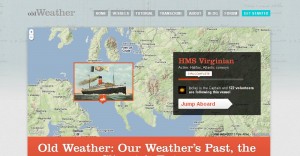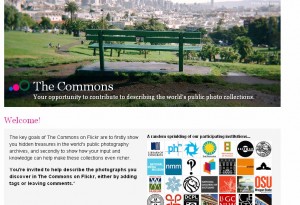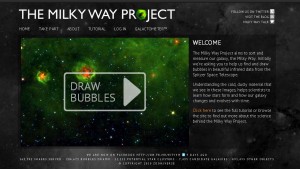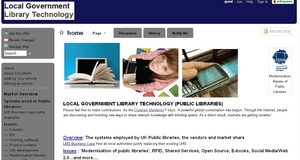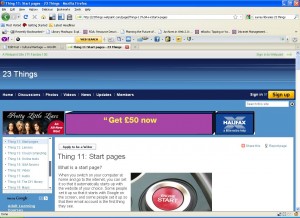Around the World in 80 Gigabytes
Posted by guestblogger on 21st February 2011
About this Guest Post
Alexandra Eveleigh is an archivist with a background working mostly within the local authority sector. She has a long standing interest in the impact of digital technologies upon archives, and her PhD research at University College London seeks to evaluate the implications for professional theory and practice of user collaboration initiatives using Web2.0 tools.
She can be contacted via her blog Around the World in Eighty Gigabytes or follow her on Twitter.
Around the World in 80 Gigabytes
Web 2.0 is here to stay. This blog is as good evidence as any of the enthusiasm with which a whole variety of online tools designed to encourage audience participation are being adopted and adapted across the cultural heritage sector. In his recent book, Cognitive Surplus, Clay Shirky argues that increased experimentation is a defining feature of this brave, new technological world. But as public sector cuts begin to bite, there is a real need to begin to evaluate existing initiatives, to map current trends in the use of Web2.0 tools, and to find out what has worked and what hasn’t within our sector. Are some participatory models more successful than others, and why? What outcomes do Web2.0 projects aim to achieve, and how can these be measured? Are these kinds of initiatives sustainable – that is, are the results sufficient to warrant the effort that organisations put into the development and maintenance of such projects? For example, are wikis merely going out of fashion or are there specific structural constraints which make this particular model of online collaboration especially challenging to design and sustain in professionalized heritage contexts?
Advocates for the use of Web2.0 technologies in archives (and I’d be one of them) tend to make much of the opportunity to reach new and different audiences, to expose archive collections to the world, even to democratize the archive. But even if as professional archivists we aspire to a transformation of the civic function of archives in our use of Web2.0 tools, we cannot achieve this on our own. As Stuart Macdonald commented in his guest post about the AddressingHistory project, the success of these types of initiatives will “ultimately be measured by continual and extended use within the wider community”. Encouraging two-way engagement is not like the usual kind of organizational development project, in that there’s no fixed end point at project launch. Web2.0 experiments are easy to start up, but hard to pull the plug on, even if only a few people are contributing, without adversely affecting community trust in your organization and their willingness to participate in the future.
My research is focused upon those initiatives which depend upon the skills or knowledge of members of the public to supplement or create new information about archival collections (as opposed to platforms like facebook which primarily enable passing comments or indications of approval on content submitted by archivists). This incorporates a wide spectrum of participant behavior from the small, atomized contributions required to take part in the Old Weather transcription of ships’ logs or to tag archival photographs on flickr commons, right through to the sustained effort and specialist knowledge needed to make a substantive contribution to The National Archives’ wiki Your Archives.
I’m particularly interested in what motivates people to participate online, so that we can establish what social and technical structures best support user participation, and feed this knowledge back into the design of future initiatives. Do online collaborative tools genuinely open up archives to crowds of ‘new’ users as is often claimed, or can the expertise of those with a prior interest and awareness of archives be more easily or usefully tapped? What mechanisms can be put in place both to encourage contributions and to establish the trustworthiness and relevance of submissions? I’m also interested to find out how potential contributors find out about online participation opportunities in the first place, and the interplay between different Web2.0 tools in promoting such projects. Some of the initial data I’ve collected suggests that although social media like twitter and facebook can play an important role in raising awareness amongst fellow professionals of new projects, and in sustaining enthusiasm amongst the participant community once established, traditional press coverage still packs an unrivalled punch in terms of making initial contact with would-be participants in cultural heritage contexts.
Certain trends are already becoming evident within the (broadly defined) archives domain. 2010 was definitely the year of the transcription platform, as organisations seek to strike a happy balance between motivating participants to contribute and maintaining adequate organizational control over the content created. Some distinctions are also now becoming evident between different styles of project. Some aim to ‘crowdsource’ lots of small contributions from as many people as possible, yet the commitment required and connection established between each individual participant and the archives may only be fleeting. More community-focused initiatives, on the other hand, bear a close resemblance to traditional volunteering opportunities or outreach work, specifically aiming to capitalize on participants’ emotional attachment with the subject matter in hand. But this is a dynamic field, and sometimes its hard to keep up with all the new projects unveiled: I wonder what new ideas 2011 will bring?
Posted in archives, Guest-blog, Web 2.0, wikis | 1 Comment »

